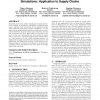Free Online Productivity Tools
i2Speak
i2Symbol
i2OCR
iTex2Img
iWeb2Print
iWeb2Shot
i2Type
iPdf2Split
iPdf2Merge
i2Bopomofo
i2Arabic
i2Style
i2Image
i2PDF
iLatex2Rtf
Sci2ools
130
click to vote
ATAL
2006
Springer
2006
Springer
Study of social consciousness in stochastic agent based simulations: application to supply chains
Empirical game theory allows studying the strategic interactions of agents in simulations. Specifically, traditional game theory describes such interactions by an analytical model, while empirical game theory employs simulations. In this paper, we use empirical game theory to study how the moreor-less selfishness of agents affects their behaviour. To this end, we assume that every agent utility can be split in two parts, a first part representing the direct utility of agents and a second part representing agent social consciousness, i.e., their impact on the rest of the multiagent system. An application to supply chains illustrates this approach. In this application, the collaborative strategy is often used by every company-agent at whatever their same level of social consciousness, which may indicate that every agent is strongly related with one other. Categories and Subject Descriptors I.2.11 [Distributed Artificial Intelligence]: Multiagent systems General Terms Economics, Experime...
ATAL 2006 | Empirical Game Theory | Intelligent Agents | Multiagent Systems | Theory Employs Simulations |
| Added | 20 Aug 2010 |
| Updated | 20 Aug 2010 |
| Type | Conference |
| Year | 2006 |
| Where | ATAL |
| Authors | Thierry Moyaux, Brahim Chaib-draa, Sophie D'Amours |
Comments (0)

